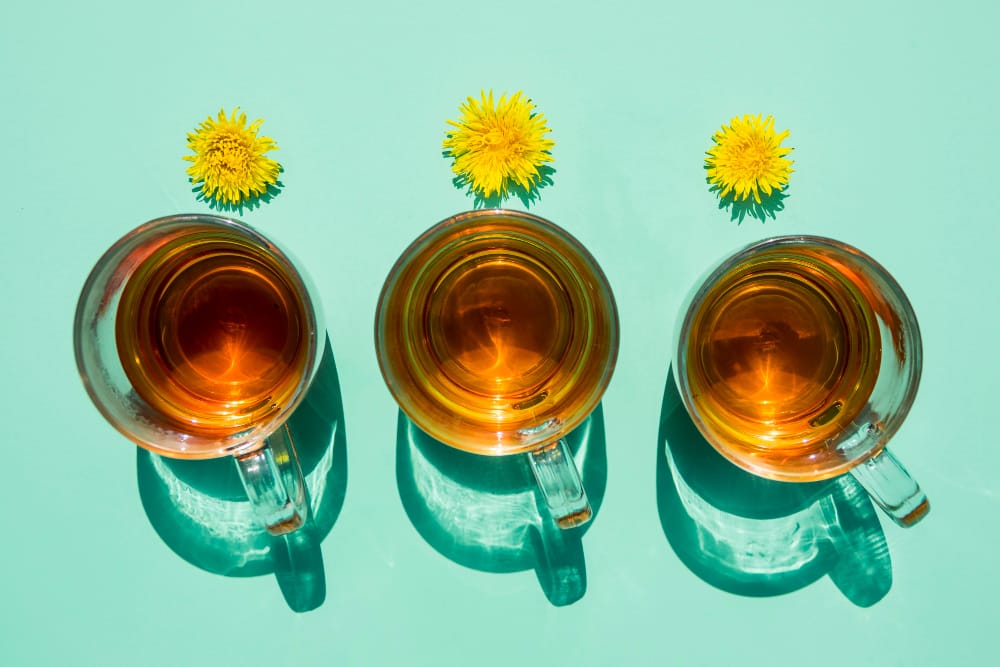FREE SHIPPING OVER $50
How to Make Dandelion Tea with Dried Root or Fresh Leaves
Dandelion tea might just be the underestimated powerhouse your wellness routine is missing. Whether brewed from dried roots or fresh leaves, it brings a gentle earthiness and a hint of bitterness that make it distinct. But more than flavor, this tea is beloved for its array of potential health benefits, from digestive aid to a natural liver booster. In this guide, we’ll cover how to make dandelion tea from both dried root and fresh leaves, tips on improving its flavor, and why you might want to make this tea a regular part of your day.
Why Dandelion Tea? The Basics

Dandelions may be yard staples, but this humble plant has deep roots (literally and metaphorically) in herbal medicine. The leaves, stems, and roots have been used for centuries as a remedy for various ailments. Dandelion tea has traditionally been valued for its role in detoxifying the liver, supporting kidney health, and aiding digestion.
Now, let’s dive into how to make this tea, whether you’re working with dried roots or fresh leaves.
How to Make Dandelion Tea from Dried Root
For a more robust and earthy flavor, try brewing dandelion tea from dried roots. Dandelion root tea brings a deeper color and slightly roasted taste that resembles a mild coffee.
- Gather Ingredients and Tools
- 1–2 teaspoons of dried dandelion root (you can buy this or dry your own)
- 8–10 oz of water
- Small pot or kettle
- Strainer
- Brew the Tea
- Heat Water: Bring the water to a boil in your kettle or on the stove.
- Add Root and Simmer: Place the dried root in the boiling water, reduce the heat to low, and let it simmer for about 10–15 minutes.
- Strain and Serve: Pour the tea through a strainer to remove the roots, and your tea is ready to drink.
- Optional Additions to Enhance Flavor
The taste of dandelion tea from dried root can be a bit bitter for some. To make it more enjoyable, try adding honey, lemon, or even a splash of coconut milk. These additions not only enhance the flavor but can add a nutritional boost.
Tip: A little cinnamon or a dash of ginger pairs beautifully with the earthiness of dandelion root, adding warmth to your tea.
How to Make Dandelion Tea from Fresh Leaves
For a lighter, more herbaceous flavor, fresh dandelion leaves are a fantastic choice. The process is quick, and the result is a tea that is subtly grassy and perfect for springtime.
- Gather Ingredients and Tools
- 1 cup of fresh dandelion leaves (washed and dried)
- 8 oz of water
- Kettle or pot
- Strainer
- Brew the Tea
- Boil Water: Heat water in your kettle or pot.
- Steep the Leaves: Once the water reaches a rolling boil, pour it over the dandelion leaves in a teapot or heat-safe mug. Let the leaves steep for about 5–10 minutes.
- Strain and Enjoy: Strain out the leaves, and enjoy your fresh dandelion leaf tea.
- Flavor Boosters for Fresh Leaf Tea
For those who find the flavor of fresh dandelion leaves a bit too “green,” try adding a slice of lemon or a spoonful of honey. Fresh mint leaves can also lend a refreshing twist.
Did You Know? Fresh dandelion leaves are rich in vitamins A, C, and K. This tea is a fantastic way to start your day with a natural boost.
How to Make Dandelion Tea Taste Better
Not everyone loves the slightly bitter flavor of dandelion tea on its own. If you’re wondering how to make dandelion tea taste better, consider these tips:
- Sweeten Naturally: Add a bit of honey, agave syrup, or stevia to take off the bitter edge.
- Add Citrus: A slice of lemon or orange brightens up the tea and makes it more refreshing.
- Mix with Other Teas: Try blending dandelion tea with herbal teas like chamomile, peppermint, or hibiscus for a unique flavor profile.
- Spice It Up: Adding warming spices like ginger, cinnamon, or cloves not only enhances the flavor but also adds a comforting aroma.
Potential Benefits of Drinking Dandelion Tea
Many people swear by dandelion tea for its variety of benefits. Here are a few reasons this herbal tea may be worth adding to your daily routine:
- Digestive Health: Dandelion root acts as a gentle diuretic, which can aid digestion and support liver health by helping the body naturally detoxify.
- Antioxidant-Rich: Both the roots and leaves contain antioxidants that can help combat oxidative stress, potentially supporting skin health and reducing the visible signs of aging.
- Supports Kidney Health: The diuretic properties may promote increased urine production, which supports the kidneys in filtering waste.
- Aids in Blood Sugar Management: Some studies suggest that dandelion may have blood sugar-lowering properties, although more research is needed to fully confirm this.
Potential Drawbacks and Considerations
Though generally safe for most people, dandelion tea may not be suitable for everyone. Here’s what to keep in mind:
- Allergies: Those allergic to plants in the daisy family (such as ragweed, chrysanthemums, marigolds) may experience an allergic reaction to dandelion.
- Drug Interactions: Dandelion can interact with certain medications, including diuretics, antibiotics, and medications that affect blood clotting. Consult with your healthcare provider if you’re taking any medication.
- Stomach Discomfort: Drinking dandelion tea on an empty stomach may cause mild stomach upset in some individuals.
Tips for Harvesting and Drying Dandelions at Home
If you have dandelions growing in your garden, you’re in luck! Harvesting your own leaves and roots can be a rewarding experience.
- Harvesting Roots: For best results, harvest roots in the fall when the plant’s energy is stored in them. Dig deep to avoid breaking the root, then wash thoroughly.
- Drying the Roots: After washing, cut the roots into smaller pieces and spread them out in a single layer to dry, either in a dehydrator or an oven set to low.
- Harvesting Leaves: Choose younger leaves in spring for a milder taste. Older leaves tend to be more bitter.
Final Thoughts
Learning how to make dandelion tea from dried root or fresh leaves offers a simple way to harness the health benefits of this versatile plant. Whether you’re sipping for flavor or wellness, dandelion tea is a unique herbal infusion that fits into many lifestyles. With options to tweak the flavor to your preference, there’s plenty of room to make it your own.
Related Articles
- Hibiscus Tea Effect on Kidneys: Benefits and Potential Risks
- Can Drinking Green Tea Daily Help You Melt Away Stubborn Fat?
- Easy Homemade Hibiscus Tea Recipe (Hot and Cold)
- 5 Herbal Tea Recipes for Stress Relief and Relaxation
- How to Make Elderberry Wine at Home: Step-by-Step Recipe
- Washing Fruit with Baking Soda: A Simple Guide to Remove Pesticides and Bacteria







